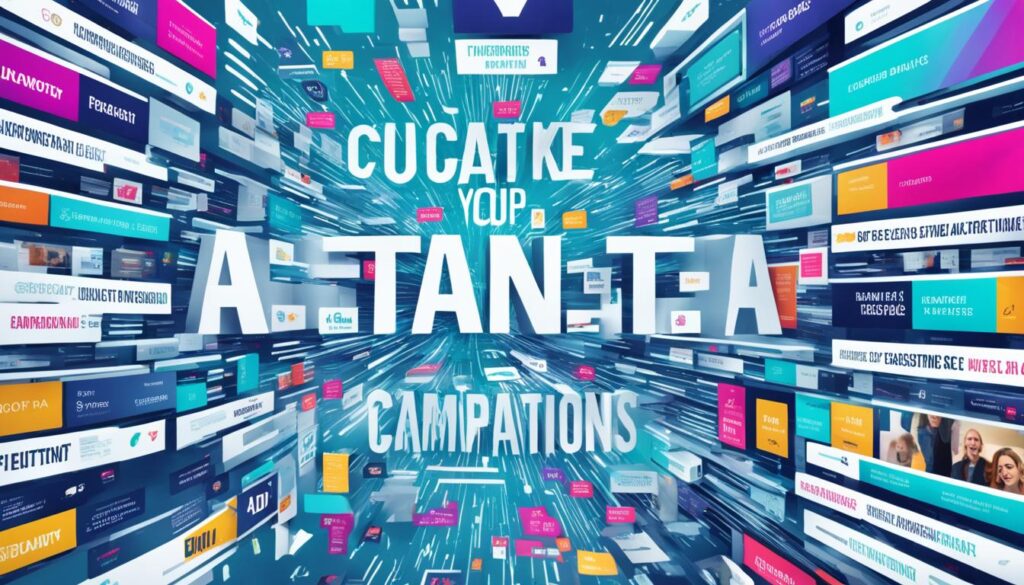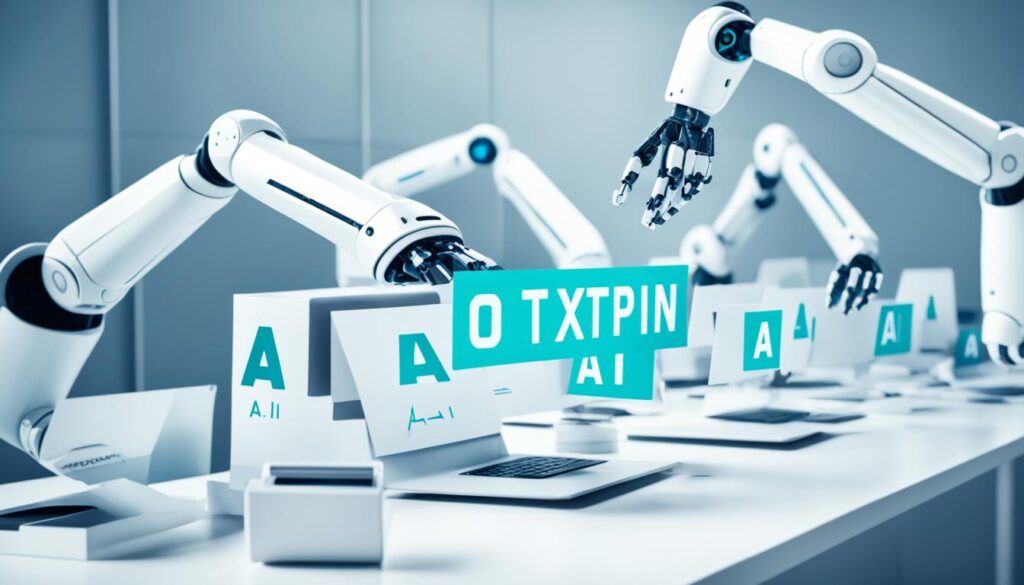In 2021, the AI market for marketing was worth 15.84 billion U.S. dollars. By 2028, it’s expected to soar past 107.5 billion U.S. dollars. This rapid growth shows how valuable AI is in shaping marketing strategies. Many experts in the field are now turning to AI. They find it crucial for understanding what customers want and for improving how we persuade them.
When it comes to AI in marketing, there are different types based on their smartness and how they fit into larger platforms. Starting with rule-based applications helps people learn the basics. But using systems that learn from data brings the biggest benefits to marketing efforts. AI’s biggest advantages are seen in core marketing tasks. It’s key for making campaigns run better and for making smarter choices.
Key Takeaways
- The market for AI in marketing is projected to grow significantly, from 15.84 billion U.S. dollars in 2021 to 107.5 billion U.S. dollars by 2028.
- Over 80% of industry experts have integrated AI into their marketing activities.
- AI-driven marketing campaigns significantly reduce customer acquisition and marketing costs by optimizing resource allocation.
- AI helps personalize customer experiences, with 56% of consumers tending to become repeat buyers when they have personalized interactions.
- Implementing AI in marketing strategies boosts campaign efficiency and improves decision-making.
Introduction to AI in Marketing
Today, AI is crucial for marketing leaders. They need to know about AI tools and their growth. Nearly 64% of marketing experts are using AI in some way. But, only 21% have it fully in their workflows. There’s a big gap here. It shows we need to use AI wisely in digital marketing. This way, we can unlock all its advantages.
AI can greatly improve marketing. It helps match what customers need with the right products or services. Right now, 40% of marketers use AI for analyzing data and making reports. Next, research (39%) and creating content (38%) also benefit. AI lets us make campaigns more effective. This makes them connect better with our target audiences.
We need to look at AI’s challenges too. It’s important for AI in marketing to be clear and easy to understand. This builds trust. Also, we must think about privacy and avoiding bias. This stops problems and avoids trouble with the law.
| Aspect | Statistics |
|---|---|
| Current jobs replaced by AI | 60% |
| AI tool usage among professionals | 64% |
| Extensive daily AI integration | 21% |
| Top AI use cases in marketing | Data analysis (40%), Research (39%), Content creation (38%) |
| Time saved daily by AI and automation | 2 hours 24 minutes |
| Marketers reporting improved personalization | 71% |
Almost 71% of marketers say AI makes customer experiences more personal. This leads to happier customers and their loyalty. Marketers are saving three hours per content piece with AI. It shows AI’s big effect on our work and time. So, we must add AI to our marketing strategies carefully and rightly. This will give us the most value.
How AI Transforms Marketing Campaigns
We are seeing a big change in marketing with AI technology. It helps make things more efficient and lets us adjust campaigns as they happen. By using ai optimization for marketing and ai-powered marketing tools, businesses can target their efforts better and make a bigger impact.
Enhanced Efficiency
AI makes things run smoother by handling routine tasks. This frees up marketing teams to think more about creative ideas. For example, AI helps create personalized content quickly, boosting productivity. Evgeny Popov of Verve Group says AI tools help marketers focus on more important work.
AI tools also improve content for SEO and make it more relevant. They quickly make high-quality materials by understanding what consumers want. This way, we can target people more accurately and use resources wisely.
Real-Time Adjustments
One of the best things about AI in marketing is making changes in real time. AI tools tweak campaigns on the spot to ensure they’re as effective as possible. This means marketers can adjust their strategies instantly, based on the latest data.
AI also lets us use augmented reality (AR) for unique customer interactions, like virtual product trials. It helps create ads that speak directly to consumer desires. This leads to messages that truly resonate with people.
To wrap up, using ai optimization for marketing and ai-powered marketing tools gives marketers a strong set of tools. These help increase efficiency, make instant adjustments, and improve campaign results.
Predictive Analytics for Better Decision-Making
Predictive analytics strengthen marketing plans by using extensive data and understanding customer habits. Through ai analytics for marketing decisions, we refine where ads go and better segment our audiences. This uncovers customer groups traditional means may miss. It lets us predict what customers will want and need in the future. As a result, our marketing efforts connect better, boosting our sales.
Using ai analytics for marketing decisions also makes our resources go further, lifting our investment returns. AI provides fast insights and can process data over time. It also learns from data to predict customer actions, like buying or leaving, helping us focus on the most valuable customers.
As AI evolves, our predictive analytics improve, stressing the need for ready data. Tools like Pecan and Plat.ai are key, automating powerful predictive models. This makes our marketing smarter, faster, and more suited to what customers want ahead of time.
The rise of AI will make predictive analytics even more powerful, automating more tasks. It will be used in many fields, from education to healthcare. In marketing, it streamlines work, automates personalized outreach, and improves how we use our resources.
| Benefits | Description |
|---|---|
| Improved Resource Allocation | Data-driven insights enable better budget management and resource distribution. |
| Enhanced Customer Engagement | Precise targeting and personalized interactions increase engagement rates. |
| Increased ROI | Optimized marketing strategies lead to higher returns on marketing investments. |
| Dynamic Resource Reallocation | Real-time feedback and forecast adjustments improve overall campaign performance. |
| Future Trend Prediction | Accurate forecasts based on historical data predict customer behavior and market trends. |
In the end, ai analytics for marketing decisions let us craft sharper, data-based marketing approaches. By better personalizing and using our budgets wisely, AI predictive analytics become a key part of today’s marketing.
Personalizing Customer Experiences with AI
In the marketing world, personalization is key for winning. Using AI to personalize marketing lets brands understand their customers better. This understanding leads to better engagement and higher sales. 92% of companies around the globe use AI for personalized experiences, boosting their growth.

AI helps businesses analyze customer feedback and actions quickly. This analysis enables brands to create more meaningful interactions. A report called The State of Social Media Report 2023 says 96% of businesses believe AI helps them make better choices. It shows how essential AI is in today’s marketing.
Effective ai personalization also means using smart segmentation. Importantly, 80% of customers like brands that personalize well. AI helps by collecting and using customer data wisely. This leads to better customer experiences and satisfaction.
Many companies are already using AI to personalize well. Sprint uses AI to find customers who might leave and helps keep them. Customerly uses AI to automate support and marketing, showing AI’s wide range of uses.
AI-driven tools are changing how marketers interact with customers. VoiceGenie offers a voice bot that can speak over 100 languages, making customer service feel human. Tools like Intellimize, Dynamic Yield, and Adobe Sensei help businesses improve their online experiences. They allow companies to test and optimize their websites and mobile interactions.
So, adopting ai personalization in marketing not just sets brands apart but also drives their growth. It does this by building loyal customer relationships.
AI-Powered Marketing Tools and Platforms
The digital marketing world is always changing. Now, using ai-powered ads and marketing tools is key to stay ahead. These technologies help us make better campaigns, understand customers, and make choices based on data.
Invoca’s AI Features
Invoca brings advanced AI that helps track phone leads and gives deep insights. It’s great for knowing who your audience is better. These AI tools work well with other systems, making decisions easier and operations smoother.
Google Analytics Integration
Google Analytics is vital for understanding how customers interact and how well campaigns do. Pairing it with ai marketing tools gives deep, useful insights. This makes marketing more efficient and more tailored.
Jasper AI, praised with over 5,000 5-star reviews, improves copywriting. Surfer SEO makes content better by focusing on keywords and how easy it is to read.
Other great ai marketing tools include Content at Scale for SEO-friendly content that feels mostly human-written. Originality AI checks for copying to keep content unique. Tools like Notion AI help with tasks, and Lexica Art creates amazing blog thumbnails. Using these AI tools makes marketing strategies more personal and effective.
Adding these advanced tools into our work gives us a big advantage. It lets marketers create campaigns that are more personal, efficient, and powerful.
AI-Driven Advertising Strategies
AI-driven marketing has changed the way we look at advertising. Now, 64% of marketing experts use AI tools in their work. This has made a big difference in how ads are created and adjusted.

AI helps send ads to the right people, which makes them more effective. 40% of marketers use AI to look at data and make reports. Another 39% use it for doing research. This shows how important AI is in marketing today.
AI makes it easy to see how ads are doing and to change them quickly. This means ads can always be their best. Marketers save a lot of time, over three hours for each piece of content, with AI.
With AI, ads can be adjusted fast to keep up with market changes. This helps get better returns on investment. AI predicts what customers will do in the future. It makes sure ads reach the right people. 71% of marketers say AI makes customer experiences more personal.
AI is crucial for buying media and getting the most out of investments. Advanced chatbots make customer service better too. They answer questions quickly. This is a sign that AI-driven campaigns are key to success in advertising now.
Using AI for Customer Segmentation
AI has changed the way we do customer segmentation. It lets us spot and understand complex patterns in customer behavior better. By using AI for marketing, companies can use sophisticated algorithms. These dig into how customers act, what they like, and how they interact. This leads to sharper, more individual customer segments.
Understanding Customer Patterns
Customer segmentation has evolved a lot since it started in 1956 with basic demographic methods. Now, AI-driven segmentation is getting very popular. All marketing leaders are looking to grow their AI use. AI is more accurate than old-school methods. It looks at what people buy, how they use the internet, and even what they say on social media.
AI can keep up with changes as they happen. This lets marketers predict things like who might stop buying. It also helps them see who could become a big spender. Finding and understanding top customers becomes easier.
Building Targeted Audiences
Using AI helps make detailed profiles for marketing. These profiles help send the right messages to the right people. The key to good digital marketing today is being specific and personal. About half of all marketers feel they’re just guessing with their choices. AI removes the guesswork by analyzing more data better and faster. This gives useful tips for reaching out to customers.
AI also means messages can be more tailored to each person. It uses lots of different data, like age, buying habits, and more. This even keeps things legal with rules like GDPR and CCPA. Making things more personal like this makes people more loyal and more likely to buy.
In the end, AI is much better at sorting customers into groups than older ways. It helps businesses do things faster, better, and get great ideas for marketing. As more companies use AI, those that do it well will stand out. They’ll be the best at making marketing feel personal and effective.
Automating Email Marketing with AI
In today’s market, using ai automation in email marketing is crucial. A study by Influencer Marketing Hub shows 63% of marketers are using it. It significantly boosts campaign efficiency and results.
The main aim of ai automation in email marketing is saving time. This lets teams achieve more without too much stress. AI combines with data tools for deeper insights, leading to better campaigns.

AI handles tasks like cleaning email lists and creating content. It personalizes emails to improve open rates, using user data. Predicting actions like purchases improves targeted efforts.
For emails to work, they must reach the right people with tailored content. AI sorts subscribers into groups automatically. This method increases engagement and conversions.
- Tools like ChatGPT optimize subject lines and personalize send times for better engagement.
- AI simplifies workflows and emails based on user actions, streamlining marketing.
- Clean Email keeps email lists current with recommendations for cleanup.
AI analytics tools offer insights into customer habits, mapping their journey. This boosts customer loyalty and revenue. Amazon sees up to 35% of its revenue from AI.
| Key Benefits of AI Automation in Email Marketing | Details |
|---|---|
| Time-saving | Reduces manual tasks, allowing teams to focus on strategy |
| Enhanced Personalization | Targets users based on behavior and preferences |
| Improved Segmentation | Automates the grouping of subscribers for more relevant content |
| Data Integration | Combines with analytics tools for deeper campaign insights |
| Higher ROI | Leads to more effective and successful email marketing campaigns |
In conclusion, ai automation in email marketing is changing how brands interact. It makes connections more relevant and efficient. As AI grows, its impact on marketing will increase.
Content Generation and SEO Optimization
In today’s digital marketing world, seo optimization with ai is key. It makes creating content easier and helps it get noticed. AI helps make content that people want to see and interact with.
SEO Enhancement
Tools like Natural Language Processing (NLP) shine in seo optimization with ai. They predict what people will search for online. This lets us create content that meets these searches. By using this knowledge, we make sure our content stays top in search results.
Automated Content Structuring
With content generation ai, organizing content has changed a lot. Tools like ChatGPT and Jasper help in making content that’s easy to follow. This means content is not just well-arranged but also keeps readers interested.
AI’s data analysis and trend forecasting enhance SEO strategies. By using seo optimization with ai, we stay ahead. This makes sure our content is always on point and engaging. AI and SEO together help increase traffic, engagement, and sales.
Improving Customer Service with AI Chatbots
AI chatbots have changed how we do customer service. They offer fast, 24/7 answers to common questions. Customers using tools like Zendesk AI get answers 30% quicker. Businesses see a 2% yearly increase in Customer Satisfaction (CSAT) scores too. This shift improves both speed and the quality of talks.
Most consumers (71%) want AI to recognize and react to their feelings during service interactions. For instance, Rhythm Energy and Photobucket have reaped big rewards. Rhythm Energy reduced ticket escalations by 50% and deflected 46% more. Photobucket cut the time to solve a problem first time by 17% and replied 14% faster. These gains come from AI that learns from customer habits, questions, and preferences, making talks more personal.
Customers value personalized suggestions. 60% find them crucial, and 59% expect companies to use their data to better their experiences. AI bots like Amazon’s Alexa offer advice tailored to individual needs, like previous buys. They cut down on the need for people to step in, answer diverse questions, and lift customer happiness. AI chatbots do have some downsides, such as not handling complex issues well. Yet, they’re majorly changing customer service for the better.



